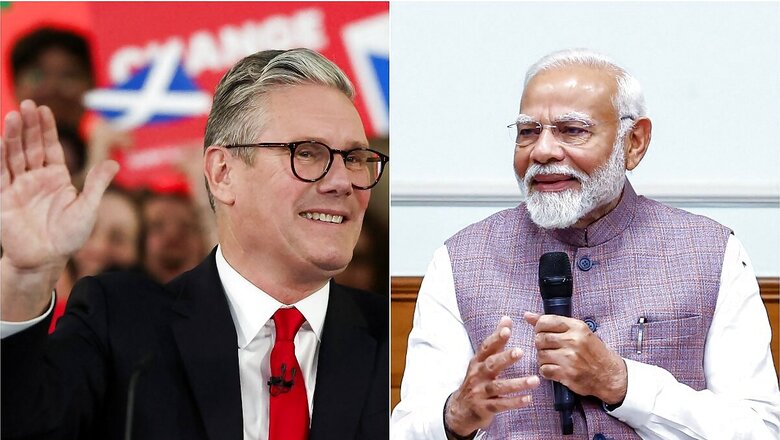Opinion | Labour Sweeps UK: In Keir Starmer, India Could Find a Powerful Friend at 10 Downing Street

views
Strengthening Bilateral Ties with India
Under Rishi Sunak, ties between India and the United Kingdom held up pretty strongly. Now, the Labour Party has stormed back to power after being out of 10 Downing Street for 14 years straight. Given the Labour Party’s historical inclination towards the Pakistani line of thought on matters concerning India, it is natural to feel that the bilateral relationship with the UK is set for another bout of rockiness.
However, Keir Starmer has been very clear in how he wants to deal with India and has projected himself as a staunch friend of New Delhi. Starmer was among the leaders who played a pivotal role in navigating the waters with the Indian community after the Labour Party in 2019 passed a motion on Kashmir that, for the lack of a better phrase, blatantly toed the Pakistani-Islamist line.
The Labour Party’s proclivity for Pakistan’s version of the situation in Kashmir and India at large is hardly unknown. In 2019, under the leadership of Jeremy Corbyn, it passed an emergency motion that sought international observers’ entry into Kashmir, demanding the right of self-determination for Indians there. The motion also called for Corbyn to meet the high commissioners of India and Pakistan to ensure there is “mediation” and a potential nuclear conflict is avoided by restoring peace. India called the move an effort to “pander to vote bank’s interest”. Back then, Keir Starmer emphasised during meetings with the Indian diaspora and public addresses that Kashmir is India’s internal issue and will be resolved by both neighbours.
Starmer appears determined to reset the Labour Party’s ties with India. He will do so as the leader of the British government as he steers both London and New Delhi closer to each other. Where Rishi Sunak appeared a bit hesitant to be viewed as an openly pro-India leader due to his own appearance and ethnicity, Starmer has a real chance to emerge as a strong-headed leader who puts realpolitik and strategic pragmatism at the fore while dealing with New Delhi.
In order to ensure the United Kingdom’s ties with India remain on a strong footing, Keir Starmer’s Labour Party must rein in both the Khalistani as well as Islamist camps within its ranks. Preventing both these camps from spewing venom against India is what will help Starmer navigate ties with New Delhi smoothly.
Remember, there is a significant Indian voter bloc in the UK. There are 1.9 million people of Indian origin residing in the UK. Despite being 2.5 per cent of the total population, Indians are estimated to be contributing about 6 per cent to the UK’s economy.
The Indian community in the UK has historically been a very pro-Labour voting bloc. In recent years though, this bloc moved towards the Conservatives for a variety of reasons, most important among which was the perception of Labour being a pro-Islamist, pro-Khalistani and anti-India party. Indians have also been concerned by Labour’s growing proximity towards Pakistani and Bangladeshi communities.
Labour Reinvents Itself to Comfort India
Today, the world knows India keeps its national interests at the forefront of all its international interactions. Case in point being the tumult in not just India’s relations with Canada, but also the United States. Over the past five months, there was a visible “5 Eyes” intelligence alliance push to corner India over its purported crackdown on Khalistani separatists globally. India stood its ground and refused to buckle under tremendous Western pressure.
As Prime Minister, Keir Starmer does not appear inclined to make foreign issues the centrepiece of his domestic politics. Remember, Starmer is promising the people of Britain a “change” and a new start. On the top of his agenda is fixing the British economy, taking it out of crippling stagnation, curbing the cost-of-living crisis and getting the healthcare system up and running seamlessly once again.
On the economic front especially, India has much to offer to the United Kingdom, as London begins decoupling from China. Starmer has himself promised a “full audit” across all government departments of the UK’s relationship with China to “set the direction and course” of London’s China policy. Last year, Starmer also said the UK needed to “wean itself off” China on issues like trade, commerce and technology.
In light of the UK’s heightened attempt at weaning itself off China, how it deals with India will be of critical importance. London hopes to swiftly finalise a Free Trade Agreement (FTA) with New Delhi. That will not happen unless the Labour government shows by its actions that it will not pander to anti-India elements, both within its ranks and across the UK at large.
Keir Starmer has reinvented the Labour Party to make it more appealing to British-Indians. In his poll manifesto, Starmer included a commitment to pursue a “new strategic partnership” with India, emphasising the trade agreement. As part of his poll campaigns, Starmer made several attempts to rebuild trust with the British-Indian community, including participating in Hindu festivals like Diwali and Holi. He recently also visited the Shree Swaminarayan Mandir in Kingsbury, where he said “there is absolutely no place for Hinduphobia in Britain” and that Labour would “build a new strategic partnership with India”.
His comment on there being no place for Hinduphobia in Britain is especially consequential, given how the Islamist and Khalistani lobbies are getting increasingly vocal in the Western hemisphere. Coupled with Starmer’s commitment to not let extremists take centre stage, there appears to be a genuine effort underway by the Labour Party to course-correct and be seen as a friend of India.
To that end, the party in April initiated an investigation into one of its Sikh councillors, Parbinder Kaur, for allegedly sharing posts that support Khalistani terrorist groups and militants who have assassinated public figures in India. In September last year, Labour also demoted Indian-origin shadow minister Preet Kaur Gill for reportedly having links with pro-Khalistani extremists. Add to that, at a Political Hustings’ event recently, Labour Party chair and shadow secretary of state for women and equalities, Anneliese Dodds, claimed that the party led by Starmer is confident of having cleansed its ranks of any members with extremist views.
Although it is too early to assess just how pro-India Britain’s new government will be, there are signs that a broad strategy of continuity vis-à-vis ties with New Delhi will be pursued by Keir Starmer. That is to say that Starmer will pick up from where Rishi Sunak left off, and build further on India and the UK’s bilateral relationship. For India, that is good news.
Having a leader who panders to extremist and radical vote banks would have posed a significant challenge for India. It would symbolise the ‘Canadanisation’ of British politics. That is a bullet New Delhi seems to have dodged, for now.
Views expressed in the above piece are personal and solely those of the author. They do not necessarily reflect News18’s views.




















Comments
0 comment